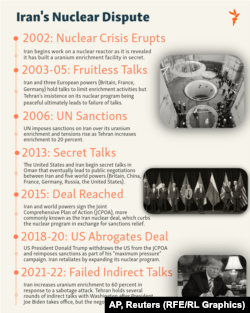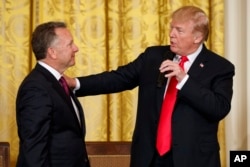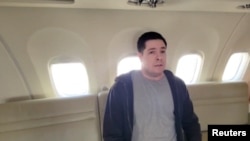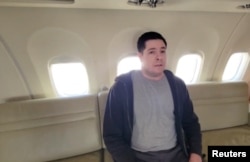News
Genocide Vote To Hurt U.S.-Turkey Ties, Erdogan Warns

NATO member Turkey, an ally crucial to U.S. interests in Iraq, Iran, Afghanistan and the Middle East, has expressed its outrage at the March 4 vote and recalled its envoy to the United States, who returned to Ankara today.
"The decision of the Foreign Affairs Committee will not hurt Turkey, but it will greatly harm bilateral relations, interests and vision. Turkey will not be the one who loses," said Erdogan, speaking at a summit of Turkish businessmen.
The Obama administration, which made a last-minute appeal against the resolution, voting of which was broadcast live on Turkish television, has sought to limit fallout and has vowed to stop the non-binding vote from going further in Congress.
Turkey has said the resolution could also jeopardize an already fragile peace process between Turkey and Armenia to end a century of hostilities and lead to further instability in the south Caucasus, an area crisscrossed by oil and gas pipelines to Europe.
The resolution urges Obama to use the term "genocide" when he delivers his annual message on the Armenian massacres in April.
Turkey accepts that many Christian Armenians were killed by Ottoman Turks but denies that up to 1.5 million died and that it amounted to genocide -- a term employed by many Western historians and some foreign parliaments.
Some analysts fear the vote may alienate Turkey at a time when there are concerns that its warmer ties with Syria, Iran, as well as Russia, marked a shift away from its traditional Western allies.
Commentators had said the bill could affect Washington's use of the Incirlik Air base in southeast Turkey. Incirlik is vital in logistical support for U.S. troops serving in Iraq and Afghanistan.
Turkey is a transit route for U.S. troops going to and from Iraq, and has 1,700 noncombat troops in Afghanistan.
Ankara has also played a key role in Obama's strategy to get Afghanistan and Pakistan to work together in fighting Al-Qaeda and Taliban militants in their borders and has hosted high-level talks between Pakistan and Afghanistan.
More News
- By RFE/RL and
- RFE/RL's Radio Farda
Iranian, US Negotiators Briefly Meet Face To Face After 'Constructive' Nuclear Talks
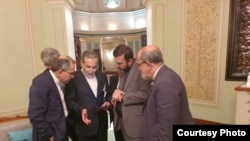
Iranian and US negotiators agreed to a second round of high-level talks over Tehran's nuclear programs next week after meeting on April 12 for more than two hours of what Tehran's officials described as a "positive" and "constructive" effort.
The US delegation, which was headed by White House envoy Steve Witkoff, issued no immediate statement on the outcome of the talks, which were held in Muscat, the capital of Oman.
The meetings are the first by officials from both countries on the issue in years, and come amid spiraling tensions and mounting military threats from Washington.
Witkoff's counterpart in the talks was Iranian Foreign Minister Abbas Araqchi, who said the sides will meet again on April 20.
While the two sides didn't meet face to face during the talks, Araqchi briefly spoke with Witkoff -- in the presence of the Omani foreign minister -- after the meeting in what he described as a "diplomatic courtesy."
"[Witkoff's] desire in the negotiations was for the general framework of the agreement to be established in the shortest possible time," Iran's top diplomat said after revealing the first direct interaction between the two nations since the Obama administration.
Days before the talks, Trump issued a new warning saying that "if necessary," the United States "absolutely" would use military force against Iran -- with Israel poised to play a leading role.
Iran's response has been defiant, signaling the high stakes for both nations and the broader Middle East.
How Did We Get Here?
The talks mark another chapter in the fraught relationship between Iran and the United States, which has been defined by cycles of diplomacy and confrontation.
The 2015 nuclear deal -- formally known as the Joint Comprehensive Plan of Action (JCPOA) -- once offered hope for detente, but Washington's withdrawal in 2018 during Trump's first term triggered a spiral of sanctions and uranium enrichment by Tehran.
European powers tried to salvage the JCPOA by launching what they called the Instrument in Support of Trade Exchanges, which was meant to facilitate non-dollar transactions with Iran to avoid violating US sanctions and dissuade Tehran from scaling back its commitments.
In practice, only one transaction was made through the mechanism, and it was eventually scrapped in 2023.
Iran's economy, which had been boosted by the JCPOA, took a big hit as Trump's "maximum pressure" campaign bit and significantly reduced Tehran's oil sales.
Shortly after Joe Biden succeeded Trump in the White House in 2021, Iran and the United States began holding a series of indirect talks to revive the nuclear deal. A draft agreement was prepared by the European Union, which serves as the coordinator of the JCPOA, but it was never signed.
Talks stalled in 2022 and remained frozen -- until now.
What's At Stake?
Trump has been clear about what he wants: Iran cannot be allowed to have a nuclear weapon. But it remains unclear whether he wants to restrict Iran's nuclear activities or completely dismantle it .
Iran is willing to offer assurances that it's not looking to acquire a bomb but has rejected the idea of entirely scrapping its nuclear program.
Despite trying to project confidence and claiming it can neutralize US sanctions, Tehran desperately needs a deal.
Iran's economy is arguably in the worst shape it has ever been, with the national currency hitting new lows against the dollar on an almost daily basis. Iranian's purchasing power has dwindled and blackouts have become a fixture of summer and winter despite Iran's global status as an energy-rich nation.
For the United States, preventing Iran from acquiring nuclear weapons is a top priority.
Iran is enriching uranium at 60 percent purity, which is widely regarded as near-weapons grade. It has also accumulated enough uranium to build several bombs, should it choose to do so.
Tehran insists its nuclear program is peaceful and has never pursued weaponization. However, with the Trump administration continuing to raise the possibility of military strikes against Iran's nuclear facilities, a growing number of Iranian officials have teased that Tehran would develop nukes if cornered.
Estimates suggest Iran could enrich sufficient uranium for a single bomb in less than a week and enough for several bombs within a month.
Ahead of the talks in Oman, Washington has sought to up the pressure even further. On April 9, the US Treasury announced sanctions on five entities and one person based in Iran for their support of Iran's nuclear program, including the Atomic Energy Organization of Iran (AEOI).
Mohammed Ghaedi, a lecturer at George Washington University's department of political science, told RFE/RL's Radio Farda that the new sanctions are unlikely to have much of an impact on Iran's nuclear program since they target AEOI's assets in the United States, which aren't many.
The new sanctions, he argued, mostly serve to strengthen the United States' leverage against Iran during negotiations.
On April 9, Trump again warned that, in the absence of a deal with Iran, the United States would resort to military action to neutralize Tehran's nuclear program.
"Israel will obviously be very much involved in that. They'll be the leader of that," he said.
Ali Shamkhani, a top aide to Iran's Supreme Leader Ayatollah Ali Khamenei, replied that continued threats of military confrontation would compel Iran to expel UN inspectors and "transfer enriched uranium to secure sites."
Who Are The Negotiators?
Araqchi is a career diplomat who has served as both a senior and lead nuclear negotiator. He was heavily involved in the JCPOA talks and led indirect negotiations with the United States to revive it.
Trump's envoy Witkoff, meanwhile, is a billionaire real estate investor, who lacks diplomatic experience but has taken on a central role in high-stakes negotiations since joining Trump's team.
On April 11, Witkoff stopped in St. Petersburg, Russia for meetings with Putin. State news agencies said the meetings lasted more than four hours.
"The theme of the meeting -- aspects of a Ukrainian settlement," the Kremlin said in a statement after the meeting concluded.
Witkoff also met with Kirill Dmitriev, a Kremlin adviser and head of the Russian Direct Investment Fund. Dmitriev has taken on a prominent role in direct talks with Washington, where he traveled last week.
"[Witkoff] is managing a lot of different files and may be out of his depth in technical discussions that are likely to dominate the Oman meetings," Gregory Brew, senior Iran analyst at the New York-based Eurasia Group, told RFE/RL.
"Araqchi is a skilled diplomat with years of experience," he said. "Unless Witkoff is backed up by a strong staff with expertise, it may complicate discussions."
Oman's discreet diplomacy has often bridged gaps between the two sides, including back-channel negotiations that led to the JCPOA. Now, Muscat is poised to host discussions once more, with both sides wary but aware of the risks of failure.
With reporting by RFE/RL correspondent Kian Sharifi and AP
- By RFE/RL
Russia, Ukraine Pound Each Other With Drones, As US Envoy Meets With Putin
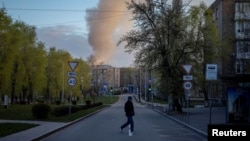
Russia and Ukraine pounded each other with drones, with Moscow complaining that Kyiv had targeted its energy facilities in violation of a tenuous cease-fire agreement that has yet to take hold.
Ukraine’s military said Russia had launched more than eight dozen drones overnight on April 12, with most of them either shot down or intercepted with electronic jamming.
At least one district in the capital, Kyiv, was damaged by drones, or debris from downed drones, Mayor Vitali Klitshcko said. At least three people were reported wounded.
Russia’s Defense Ministry, meanwhile, said that more than 150 Ukrainian drones had been launched, including at five energy facilities.
On March 11, Ukraine and the United States announced a breakthrough agreement paving the way for a 30-day cease-fire contingent on Russia's signing on.
A major foreign policy priority for US President Donald Trump, it was the first concrete proposal on the negotiating table since the early weeks after Russia's all-out assault on Ukraine in February 2022.
Russian President Vladimir Putin balked, saying he agreed in principle but there were "nuances" that would have to be addressed and attaching conditions including a halt to Western supplies of weapons to Kyiv.
Despite the cease-fire announcement, the two sides have continued to fire drones at one another.
Ukraine also announced that an F-16 fighter jet pilot had been killed in action, the second such combat death involving the US-made planes.
The military gave no details as to Pavlo Ivanov's death.
Ukraine has small flotilla of F-16s that it started receiving in 2024. In August 2024, Ukrainian officials said an F-16 had crashed while repelling a Russian missile attack, killing its pilot.
Speaking to a Senate committee last week, US Army General Christopher Cavoli said Ukrainian F-16s were flying daily as part of both defensive and offensive missions.
The United States, meanwhile, continues to engage in direct talks with Russian officials, as part of a wider deal aimed at rebuilding bilateral relations. White House envoy Steve Witkoff flew to St. Petersburg, Russia, to meet with President Vladimir Putin for more than four hours of talks on April 12.
Neither Witkoff nor the White House issued any public comment after the meeting, though the Kremlin said “aspects of a Ukrainian settlement” had been discussed.
Trump has signaled impatience with the pace of talks to cement a cease-fire in Ukraine. Hours after Witkoff landed in St. Petersburg, Trump posted a message on his social media account, calling the war "senseless" and said it "should have never happened."
"Russia has to get moving. Too many people are DYING,” he wrote.
The White House’s envoy for Ukraine, Keith Kellogg, suggested that British and French troops could adopt zones of control in Ukraine.
Speaking in an interview published on April 12 with The Times of London newspaper, Kellogg suggested they could have areas of responsibility west of the Dnieper River, as part of a "reassurance force", with a demilitarized zone separating them from Russian-occupied areas in the east.
"You could almost make it look like what happened with Berlin after World War II, when you had a Russian zone, a French zone, and a British zone, a US zone," he said.
Kellogg later posted a message to X, saying his comments had been misconstrued.
In his interview, Kellogg also said relations between Ukraine and the United States were now "back on track,” and he pointed to a proposed deal on Ukraine's mineral resources.
However, Reuters cited unnamed officials as describing a meeting between US and Ukrainian officials about the mineral deal as "antagonistic.”
The strains were due to the fact that the newest draft proposal is more expansive than the original version.
The latest draft, according to Reuters and The New York Times, would give the United States privileged access to Ukraine's mineral deposits and require Kyiv to place all income from the exploitation of natural resources -- by both Ukrainian state and private firms -- into a joint investment fund.
Trump has said he viewed access to Ukraine's rare and valuable minerals as a way to recoup billions of dollars in US military aid to Kyiv.
- By RFE/RL
Trump Says He Passed Physical Exam And Feels 'In Very Good Shape'
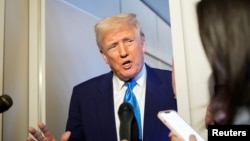
US President Donald Trump said he felt "in very good shape" after his first medical checkup since returning to the White House.
Trump, 78, arrived on April 11 at the Walter Reed Medical Center in suburban Washington for a physical exam that put the focus on cardio and cognitive tests. He later told reporters on Air Force One that he “got every answer right" on the cognitive test and said he had not only a “good heart” but also a "very good soul."
"It went, I think, well,” Trump said of the exam, adding that he underwent “every test you can imagine” and that a report is expected to be issued on April 13.
American presidents traditionally provide details about their health and wellbeing though they are not compelled to do so.
Trump has repeatedly been accused of a lack of openness about his health, but the White House said that presidential physician Sean Barbabella would give a readout of the exam and that "of course" it would be made public.
"I can confirm the president is in very good shape, as you see on a near daily basis," White House spokeswoman Karoline Leavitt said.
Trump, a prolific golfer who abstains from alcohol and cigarettes, has repeatedly boasted about his vigor since starting a second term, but he is known to indulge in fast food. He likes it so much he staged a photo op at a McDonald's during his campaign last year.
The White House doctor in his first term, Ronny Jackson, said in 2018 that with a healthier diet Trump could "live to be 200 years old." The exams conducted during his first term revealed that Trump was taking medication to treat high cholesterol.
Jackson's report suggested Trump should aim to lose 10 to 15 pounds but said he was generally in "excellent health" with no signs of "any cognitive issues."
A year later, an exam found the 1.9-meter tall president weighed 110 kilograms. Trump appears to have lost some weight since then.
Age and cognitive health became a major issue in the 2024 election when Trump and then-President Joe Biden faced off as the oldest major party candidates in history.
Biden, now 82, was forced to drop out of the race after verbally stumbling through a TV debate against Trump in June that put concerns over his health to the top of the agenda.
Since returning to office Trump has repeatedly compared his own vigor to Biden's, while the White House has accused the previous administration of covering up what it says was Biden’s decline.
With reporting by Reuters and AFP
Public Executions By Taliban Spark Global Outcry
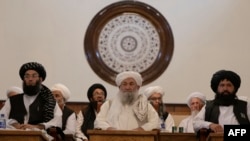
The Taliban carried out public executions of four individuals on April 11 -- the highest single-day number since it returned to power -- prompting a wave of condemnation from groups around the world.
Local Taliban officials confirmed that the individuals — who were accused of murder — were executed in front of crowds gathered in the western provinces of Farah, Nimroz, and Badghis.
Eyewitnesses at one of the sites, who spoke to RFE/RL's Radio Azadi on condition of anonymity, said family members of the victims shot the accused.
"Their families offered blood money to spare their relatives' lives, but the victims' relatives refused. People here don't fully understand these issues — this kind of event leaves a serious psychological impact," the person said.
In Nimroz province, the Taliban invited civilians, civil servants, and military personnel to witness the execution at a stadium in Zaranj.
"The man was shot by the victim’s family. Watching this scene was unbearable. No one wants to witness a killing, even if it is declared a divine punishment," said one local resident.
The executions, part of the Taliban’s hardline interpretation of Islamic law, are described by the regime as "qisas," or retributive justice.
Since they seized power in August 2021, the Taliban have resumed corporal punishments and public executions, echoing their repressive rule of the 1990s. So far, at least 10 individuals have been publicly executed.
Rights organizations say these punishments are a clear violation of international law.
They say the use of executions as a public spectacle is not only inhumane but also contributes to a culture of fear and trauma in communities already scarred by decades of war and violence.
In a statement posted on X, Amnesty International condemned the executions, calling them "deplorable."
"Afghanistan: The deplorable public executions of four people in Nimroz, Farah and Badghis in Afghanistan today point to Taliban’s continued alarming abuse of human rights in the country. The Taliban de facto authorities continue to flagrantly flout human rights principles," it said.
"The international community must put pressure on the Taliban to stop this blatant human rights abuse and help ensure international guarantees are upheld in Afghanistan."
The Taliban claim that the executions followed "transparent investigations and justice procedures," but the United Nations and multiple human rights bodies have consistently disputed such assertions, citing the absence of a functioning judicial system and lack of due process in Taliban courts.
"We are appalled by executions of four men in the Badghis, Nimroz and Farah provinces this morning," the United Nations rights office said on X, urging "the de facto authorities in Afghanistan to place a moratorium on the use of the death penalty."
Lukashenko Invites 150,000 Pakistanis To Work In Belarus Amid Labor Shortage
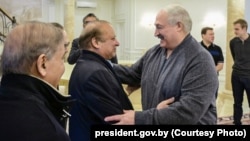
In a rare moment of international visibility, Belarusian strongman Aleksandr Lukashenko welcomed Pakistani Prime Minister Shehbaz Sharif for an official visit to Minsk on April 10, hailing it as a significant milestone in bilateral relations.
The visit, which continued on April 11, resulted in multiple agreements spanning military cooperation, food security, and trade. Most notably, Lukashenko offered to accept up to 150,000 Pakistani workers to help address Belarus's deepening labor shortage.
For Lukashenko, whose presidency remains unrecognized by the West following the widely disputed 2020 election and subsequent brutal crackdown on dissent, any direct engagement with a foreign leader carries enormous symbolic and strategic value. Isolated diplomatically, shunned by the European Union and the United States, and increasingly reliant on Moscow, Lukashenko has few opportunities to present himself as a legitimate international actor.
"Pakistan has many people who want and are ready to work in Belarus," Lukashenko said during a joint press conference, emphasizing Belarus would create the "necessary conditions" for their employment. With more than 198,000 job vacancies reported across the country, the proposal aims to inject labor into an economy under pressure.
The move, however, raises alarm bells across neighboring European Union states.
The offer to import tens of thousands of Pakistani workers can certainly be viewed with suspicion in neighboring NATO member states Poland, Latvia, and Lithuania.
In a 2021-22 border crisis, Belarus was accused of using migrants as pawns in a political standoff with the EU. Belarus facilitated travel for migrants from the Middle East, Africa, and South Asia -- including Pakistan -- and directed them toward the EU's external borders, triggering a humanitarian and security crisis.
At the time, thousands of migrants were left stranded in forests along Belarus's borders with Poland, Latvia, and Lithuania, often with no food, shelter, or legal protection.
Belarusian authorities were accused of weaponizing migration in retaliation for Western sanctions.
Polish, Latvian, and Lithuanian border guards resorted to pushbacks, resulting in dozens of deaths, international condemnation, and an enduring mistrust of Minsk's migration policies.
During the visit, Belarus and Pakistan signed a military cooperation agreement and a roadmap for defense-industrial ties through 2027, deepening ties between the two countries, as well as other pacts and economic memoranda.
Notably absent from the spotlight, however, is any substantial record of recent trade volume.
The Belarusian Foreign Ministry last reported annual bilateral trade with Pakistan for the year 2020, saying it ranged from $50 million to $65 million -- a far cry from a 2015 vow to grow trade between the two countries to $1 billion.
For comparison, Pakistan's primary trading partners in 2023 included China, the United Arab Emirates, and Saudi Arabia; Belarus didn't make the list.
For Lukashenko, however, Sharif's visit may offer a diplomatic lifeline and a moment of validation. For the EU, it brings back memories of 2021-2022. It may be a warning sign that the authoritarian leader of Belarus could once again use people as leverage in his ongoing standoff with the West.
- By Ray Furlong
Trump Envoy Witkoff Holds Talks With Putin During Surprise Stop In Russia
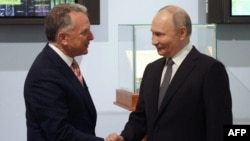
US Special Envoy Steve Witkoff held talks with Russian President Vladimir Putin during a surprise visit on April 11 to St. Petersburg, their third meeting since US President Donald Trump took office in January pledging to repair ties with Moscow.
Witkoff stopped in St. Petersburg on his way to high-level talks with Tehran over Iran's nuclear program scheduled for April 12 in Oman.
News of the meeting broke as Ukrainian President Volodymyr Zelenskyy said on X that a month had now passed since Russia rejected a US proposal for a "full and unconditional cease-fire."
Hours after Witkoff landed, Trump also posted on social media: "Russia has to get moving. Too many people are DYING." He again called the conflict "senseless" and said it "should have never happened."
Putin was shown on state TV greeting Witkoff in St. Petersburg's presidential library for talks that state news agencies later said lasted more than four hours.
"The theme of the meeting -- aspects of a Ukrainian settlement," the Kremlin said in a statement after the meeting concluded.
Witkoff's visit came amid a flurry of diplomatic activity around the war in Ukraine that includes US-Ukrainian talks in Washington and a meeting chaired by Britain and Germany in Brussels.
The Russian state news agency TASS said Witkoff immediately met with Kirill Dmitriev, a well-connected Kremlin insider and head of the Russian Direct Investment Fund.
Last week the two men met in Washington, D.C., where they discussed strengthening bilateral relations.
Dmitriev called the talks on April 11 productive, according to TASS.
The visit comes a day after US and Russian officials met in Istanbul to discuss normalization of diplomatic ties, potentially reversing some of the mass expulsions of embassy staff since Russia's full-scale invasion of Ukraine in 2022.
Last month, Witkoff's meeting with Putin paved the way for a phone call between the two presidents. He also visited in February, and was part of the US-Russia talks in Riyadh.
Who is Steve Witkoff?
Witkoff is a New York property developer and friend of Trump who has no previous diplomatic experience. This has raised concerns in some quarters about his lead role in such delicate talks.
"The fact that he lacks the context and history of how Russians negotiate and deal with the American side is, I think, a problem," said David Kramer, who held a senior position at the State Department during the George W. Bush administration.
"Putin says nice things to him, gives him a portrait of the president, talks about going to church and praying for his friend (Trump)," Kramer told RFE/RL on April 10.
"Those are pretty old KGB tactics. And Witkoff, I don't think, has the awareness to understand what is going on there."
Trump has strongly praised Witkoff. Speaking in January, he called him "a great deal-maker...a great negotiator, a great person."
Witkoff's visit will be aimed at pushing forward stalled US efforts to broker a cease-fire between Russia and Ukraine.
Trump has recently criticized Russia for ramping up its bombing campaign of Ukraine and not moving faster on peace talks.
But Trump has also said Zelenskyy was "trying to back out" of an agreement giving Washington access to Kyiv's deposits of rare earth minerals.
A Ukrainian delegation was due for talks on the deal in Washington later on April 11.
Turkey Pledges Black Sea Mission
Meanwhile, in Brussels, progress has been made in forming a European-led military force to deploy to Ukraine in the event of a cease-fire or peace deal.
Two European diplomatic sources told RFE/RL that Turkey had declared it was willing to "assume responsibility for the maritime dimension."
This was at a meeting of the "coalition of willing" on April 10.
So far, only Britain and France have made public pledges to commit forces, although other countries have said they are open to doing so depending on circumstances of their deployment.
On April 11, Britain and Germany chaired a meeting of the Ukraine Defense Contact Group in Brussels, which coordinates military aid to Ukraine.
This was set up in 2022 and chaired by then-US Defense Secretary Lloyd Austin. His successor, Pete Hegseth, has taken a back seat in the group and attended this meeting by video link.
German Defense Minister Boris Pistorius said Hegseth made "interesting and correct assessments" in his comments.
Ahead of the talks, European countries pledged new support for Ukraine in the coming months and years.
Britain and Norway announced a joint package for military drones, radar systems, and anti-tank mines.
Germany and the Netherlands said they would provide additional air and missile defense systems.
"This will have an impact on the battlefield this year," said Pistorius.
Dutch Defense Minister Ruben Brekelmans told RFE/RL that he expects the United States to put its “political weight” behind the European plans, and said the Netherlands and other allies are already accelerating their material support for Ukraine.
- By RFE/RL
Russian-American Ksenia Karelina Freed In Prisoner Swap Arrives Back In US
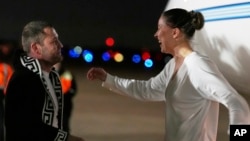
Russian-American citizen Ksenia Karelina, who was imprisoned in Russia for donating $51 to a US-based Ukrainian aid charity, has arrived back in the United States after a prisoner swap for Arthur Petrov, a dual German-Russian citizen who allegedly exported sensitive microelectronics.
US Secretary of State Marco Rubio confirmed Karelina's release in a social media post on April 10 that credited President Donald Trump for gaining her freedom. Russia's security service, the FSB, confirmed that Petrov was the Russian citizen released in the exchange.
The swap marks the second such exchange between Washington and Moscow since Trump took office in January.
The plane carrying Karelina landed around 11 p.m. local time at Joint Base Andrews outside Washington, D.C., where she was greeted by her fiance.
A 33-year-old former ballet dancer, Karelina moved to the United States in 2015 and received US citizenship in 2021.
"They released the young ballerina and she is now out, and that was good. So we appreciate that," Trump said, adding that the release followed conversations with Russian President Vladimir Putin.
Karelina was found guilty last year of treason by a Russian court in Yekaterinburg for transferring money to Razom For Ukraine, a US nonprofit that provides medical and humanitarian aid, in early 2022.
Dora Chomiak, the CEO of Razom For Ukraine, said in a statement that the group was "overjoyed" about Karelina's release, but sharply criticized Russia for her detention.
"The case against Ksenia Karelina was a farce from the moment of her detention," said Chomiak. "Peacefully demonstrating solidarity with the people of Ukraine is not a crime. Vladimir Putin imprisoned her for protesting against Russia's invasion and allegedly donating to help alleviate the suffering of Ukrainians."
"She was unconscionably jailed for over a year for exercising the same freedoms that every American citizen holds, and that all Ukrainians are fighting to keep," the statement added.
Petrov, 34, was arrested in 2023 in Cyprus at the request of the United States.
The US Justice Department alleged Petrov had participated "in a scheme to procure US-sourced microelectronics for manufacturers supplying weaponry and other equipment to the Russian military."
The Wall Street Journal quoted an unidentified CIA official as saying CIA Director John Ratcliffe conducted the talks to clinch the swap, which was mediated by the United Arab Emirates.
Ratcliffe hailed “the CIA officers who worked tirelessly to support this effort.” The CIA also emphasized that “the exchange shows the importance of keeping lines of communication open with Russia, despite the deep challenges in our bilateral relationship.”
Abu Dhabi was the site of another prisoner swap between Russia and the United States. In December 2022, US basketball star Brittney Griner was swapped for Russian arms dealer Viktor Bout.
The United Arab Emirates has also been a mediator in prisoner swaps between Russia and Ukraine.
Russia and the United States conducted the prisoner swap as delegations from the two countries arrived in Istanbul for talks on normalizing the work of their diplomatic missions.
In February, the United States released a confessed Russian cybercriminal, Aleksandr Vinnik, in return for the American teacher Marc Fogel.
Karelina, Fogel, and others are among a growing number of Americans arrested in Russia in recent years as tensions between Moscow and Washington intensified over the war in Ukraine.
With reporting by AP
US Ambassador To Ukraine Resigns Early Amid Washington's Peace Efforts
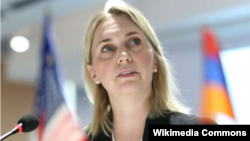
US Ambassador to Ukraine Bridget Brink will step down, the State Department said, leaving the post vacant a time when crucial peace negotiations are under way between Washington, Kyiv, and Moscow.
Appointed by former President Joe Biden, Brink has served as ambassador in Kyiv since May 2022, navigating US-Ukraine relations during a critical period marked by Russia's full-scale invasion of Ukraine.
"Ambassador Brink is stepping down. She's been the ambassador there for three years -- that's a long time in a war zone," State Department spokeswoman Tammy Bruce told reporters on April 10.
She is expected to leave her post in the coming weeks.
Brink's tenure spanned two presidential administrations that have differed in their policies toward Ukraine.
Relations with Moscow deteriorated to post-Cold War lows under the Biden administration, which broke off communications with Russian President Vladimir Putin amid Europe's largest land war since World War II.
Conversely, the Trump administration has reestablished direct contact with the Kremlin -- Trump and Putin have spoken by phone at least twice in recent months -- and Washington is currently attempting to mediate a peace deal between Ukraine and Russia.
Brink is the latest senior career diplomat to resign under the current administration, including John Bass, the State Department’s third-highest official, who stepped down in January.
No reason was given for Brink's decision to step down, but Reuters quoted sources as saying the move was made of her own volition.
Brink faced criticism from Ukrainian President Volodymyr Zelenskyy for her response to last week's deadly Russian missile strike on the Ukrainian city of Kryviy Rih, which killed 20 people at a restaurant and nearby playground, including nine children.
In a social media post about the April 4 attack, Brink did not mention Russia as being responsible, prompting Zelenskyy to express disappointment.
In a post about a Russian missile strike two days later, the diplomat mentioned Russia.
“As of 6:30 a.m., Kyiv and the rest of Ukraine remain under fire from ballistic and cruise missiles from Russia. Loud explosions in the capital and reports of attacks in several cities,” Brink wrote on X on April 6.
- By RFE/RL
Russia Frees Woman Jailed For Donating $51 To Ukraine In US Prisoner Swap
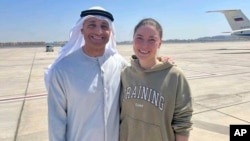
Russian-American citizen Ksenia Karelina, who was imprisoned in Russia for donating $51 to a US-based Ukrainian aid charity, is on her way to the United States as part of a prisoner swap for Arthur Petrov, a dual German-Russian citizen who allegedly exported sensitive microelectronics.
US Secretary of State Marco Rubio confirmed Karelina's release in a social media post on April 10. Russia's security service, the FSB, confirmed that Petrov was the Russian citizen being held in a US jail who was released in the exchange.
The swap marks the second such exchange between Washington and Moscow since US President Donald Trump took office in January.
A 33-year-old former ballet dancer, Karelina moved to the United States in 2015, married a US citizen, and received US citizenship in 2021.
Karelina's lawyer, Mikhail Mushailov, confirmed his client's release, saying the exchange occurred in Abu Dhabi.
"Karelina is on a plane back home to the United States. She was wrongfully detained by Russia for over a year and President Trump secured her release," Rubio said in his post.
Karelina was found guilty last year of treason by a Russian court in Yekaterinburg for transferring money to Razom For Ukraine, a US nonprofit that provides medical and humanitarian aid, in early 2022.
Dora Chomiak, the CEO of Razom For Ukraine, said in a statement that the group was "overjoyed" about Karelina's release, but sharply criticized Russia for her detention,
"The case against Ksenia Karelina was a farce from the moment of her detention," said Chomiak. "Peacefully demonstrating solidarity with the people of Ukraine is not a crime. Vladimir Putin imprisoned her for protesting against Russia's invasion and allegedly donating to help alleviate the suffering of Ukrainians."
"She was unconscionably jailed for over a year for exercising the same freedoms that every American citizen holds, and that all Ukrainians are fighting to keep," the statement added.
Petrov, 34, was arrested in 2023 in Cyprus at the request of the United States.
The US Justice Department alleged Petrov had participated "in a scheme to procure US-sourced microelectronics for manufacturers supplying weaponry and other equipment to the Russian military."
The Wall Street Journal quoted an unidentified CIA official as saying CIA Director John Ratcliffe conducted the talks to clinch the swap, which was mediated by the United Arab Emirates.
Abu Dhabi was the site of another prisoner swap between Russia and the United States. In December 2022, US basketball star Brittney Griner was swapped for Russian arms dealer Viktor Bout.
The United Arab Emirates has also been a mediator in prisoner swaps between Russia and Ukraine.
Russia and the United States conducted the prisoner swap as delegations from the two countries arrived in Istanbul for talks on normalizing the work of their diplomatic missions.
In February, the United States released a confessed Russian cybercriminal, Aleksandr Vinnik, in return for the American teacher Marc Fogel.
- By RFE/RL
Beijing Rebukes Zelenskyy For Saying Chinese Recruits Fighting For Russia
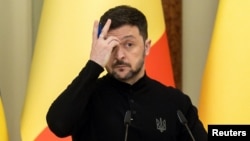
China pushed back against Ukrainian President Volodymyr Zelenskyy for making what it called "irresponsible remarks" about Beijing being aware that its citizens have been recruited to fight for Russia in Ukraine.
The April 10 comments from China's Foreign Ministry come the day after Zelenskyy said Ukrainian authorities had information on 155 Chinese nationals fighting alongside Russia. The claim followed video released by the Ukrainian military purporting to have captured two Chinese mercenaries in eastern Ukraine.
"We would advise the relevant parties to recognize China's role correctly and clear-headedly and to refrain from expressing irresponsible remarks," ministry spokesman Lin Jian said at a press briefing, without mentioning Ukraine or its president by name.
Zelenskyy has escalated his criticism of Beijing in recent days following the announcement that Kyiv captured two Chinese nationals in the eastern Donetsk region.
Hours after China's statement, Zelenskyy issued a statement on Telegram with a video of a man in a military uniform answering an interrogator's questions in Mandarin with the help of an interpreter. The man confirmed he was a Chinese national recruited to the Russian armed forces to fight in Ukraine.
"We continue to clarify all the circumstances of Chinese citizens' involvement in the Russian occupying contingent. The Security Service of Ukraine is carrying out all necessary procedures with the individuals who were recently captured in the Donetsk region," Zelenskyy's statement said.
"It is obvious these are not isolated cases but systematic Russian work, in particular, on the territory and in the jurisdiction of China, to recruit citizens of this state for war," Zelenskyy added.
Speaking at a press conference a day earlier, the Ukrainian president accused Beijing of turning a blind eye to the recruitment of its citizens and allowing them to participate in the war, which is now in its fourth year.
"We record that they [China] knew about it," Zelenskyy said. "We record that these are Chinese citizens, they are fighting against us, using weapons against Ukrainians on the territory of Ukraine. Their motivation, money or not, politics, etcetera, is not yet known to me. But it will be known."
Beijing has denied sending soldiers to Ukraine to fight with Russian forces, but the presence of Chinese nationals fighting in the war has been documented before in Russian- and Chinese-language social media posts. A hundred or more Chinese citizens are estimated to have traveled to fight as mercenaries with Russia's army.
A Russian Defense Ministry hospital database obtained exclusively by RFE/RL in February also showed that Chinese mercenaries had been wounded serving alongside Russian troops.
Zelenskyy told reporters he was not aware if China "gave some kind of command" to those now fighting for Russia. He maintained, though, that Beijing must have been aware of people joining a foreign military in exchange for payment.
While foreign soldiers fighting for both Ukraine and Russia have been a factor in the war since Moscow's full-scale invasion in 2022, the episode is the first time Kyiv has made such claims about Chinese fighters.
This marks a change of track for Zelenskyy, who had previously been careful dispensing criticism of Beijing, despite its staunch diplomatic and economic support for Russia throughout the war. China has helped the Kremlin's war effort with increased trade and the strategic supply of militarily useful dual-use goods.
US and European officials have criticized this level of support provided by China. European Union foreign policy chief Kaja Kallas reiterated this to reporters on April 9 following news of the captured Chinese recruits, saying Chinese territory is a conduit for around 80 percent of the dual-use goods currently entering Russia.
"What is clear is that China has been the key enabler of Russia's war," she said. "Without Chinese support, Russia wouldn't be able to wage war [on the scale] that it has."
Beijing, however, has maintained that it is a neutral party in the war and stopped short of providing Russia with weapons or military expertise.
Kyiv's relationship with the United States had become fraught as US President Donald Trump has pushed for Russia and Ukraine to agree to a cease-fire and work toward a peace deal to end the war.
Analysts have speculated that Zelenskyy may be hoping Trump's antipathy toward China -- a country Washington is engaged in an escalating trade war with and has designated as a global rival -- could improve his standing with the Trump administration.
"This could be used by the Trump administration to, among other things, increase pressure on China," Ihor Reiterovych, a Ukrainian political analyst, told RFE/RL's Ukrainian Service. "This could even have an indirect impact on US-Russia relations, because there is a new element that should definitely be taken into account."
Zelenskyy had earlier accused Russia of "dragging China into this war," a claim dismissed by Kremlin spokesman Dmitry Peskov on April 10.
"Partner, friend, and comrade. China has always taken a very balanced position, so Zelenskyy is wrong," he told reporters.
Meanwhile, the governor of Ukraine's Dnipropetrovsk region, Serhiy Lysak, said on April 10 that a Russian missile attack on the regional capital, Dnipro, killed one person and injured three others.
With reporting by the AFP and RFE/RL's Ukrainian Service
- By RFE/RL
Trump Repeats Military Threat Against Iran Ahead Of Nuclear Talks
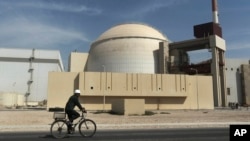
US President Donald Trump has again threated to use military force if Iran does not agree to end its nuclear program and said Israel would be the "leader" of a potential military strike.
Trump told reporters on April 9 at the White House that "if necessary," the United States "absolutely" would use military force. He made the comments after being asked about talks between US and Iranian officials scheduled to take place this weekend in Oman and how long they may last.
"We have time," Trump said, adding that there's no definitive timeline for the talks to come to a resolution.
"When you start talks, you know if they’re going along well or not," Trump said. "And I would say the conclusion would be when I think they’re not going along well. So that's just a feeling."
Trump announced the talks on April 8 during an Oval Office briefing with Israeli Prime Minister Benjamin Netanyahu.
Netanyahu said he supports Trump's diplomatic efforts to reach a settlement with Iran. He added that Israel and the United States share the same goal of ensuring that Iran does not develop a nuclear weapon.
Trump said that if the use of military force is necessary, "Israel will obviously be very much involved in that."
Both sides have framed the talks in Oman as an exploratory meeting to see if negotiations can be held. Trump said the talks would be "direct," while Iran has described the engagement as "indirect" talks.
The United States will not be "asking for much" at the talks, Trump said, repeating his oft-stated position that Iran "can't have a nuclear weapon."
The United States is increasingly concerned as Tehran appears to be closer than ever to having a nuclear weapon. Iran has long maintained that its nuclear program is for peaceful purposes.
The United States and other world powers in 2015 reached a comprehensive nuclear agreement that limited Tehran's enrichment of uranium in exchange for the lifting of economic sanctions. But Trump unilaterally withdrew the United States in 2018, calling it the "worst deal ever."
US Defense Secretary Pete Hegseth voiced hope that US-Iran talks could be resolved peacefully after Reuters reported on April 9 that as many as six B-2 bombers had relocated to a US-British military base on the Indian Ocean island of Diego Garcia.
Asked if the B-2s were meant to send a message to Iran, Hegseth said: "We'll let them decide." He called the bombers "a great asset," telling reporters during a trip to Panama that they send a "message to everybody."
The US Treasury Department earlier on April 9 issued new sanctions targeting Iran's nuclear program. Five entities and one person based in Iran were designated for new sanctions in connection with their alleged support of Iran's nuclear program, the department said in a news release.
The designated groups include the Atomic Energy Organization of Iran and subordinates Iran Centrifuge Technology Company, Thorium Power Company, Pars Reactors Construction and Development Company, and Azarab Industries Company.
In his comments to reporters at the White House, Trump said the people of Iran "are so incredible," but the government is a "rough regime."
"I want Iran to be great," Trump said. "The only thing that they can’t have is a nuclear weapon. They understand that."
With reporting by Reuters and AP
- By Ray Furlong
Merz Announces New German Government, Cites Concerns About Russia, US Tariffs
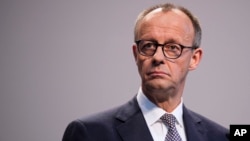
Germany's Christian Democrat leader Friedrich Merz has announced that talks on forming a new coalition government have been completed, stating it would aim to take office in early May.
Merz noted the coalition talks took place amid "growing international political tensions," citing Russian President Vladimir Putin's ongoing invasion of Ukraine and US tariffs.
"The Russian aggressor, Putin, shows no willingness to end the war and to let the guns go silent. At the same time, economic uncertainties are growing enormously. Just this week, US government decisions have caused new turbulence," Merz said.
Merz will be the new German chancellor in a coalition with the Social Democrats, led by Lars Klingbeil, who is expected to be Finance Minister.
Support For Ukraine
As the new government was announced, its 144-page policy plan was published, pledging strong support for Ukraine.
"We will provide comprehensive support to Ukraine so that it can effectively defend itself against the Russian aggressor and assert itself in negotiations," it says.
Germany's outgoing government, which is led by the Social Democrats under Chancellor Olaf Scholz, has been a key supplier of military and economic aid to Ukraine since Russia's full-scale invasion in 2022.
Merz, as opposition leader, has often called on it to be faster and bolder in this. But it's not clear what this will mean in practice.
During a recent visit to Berlin, Ukrainian President Volodymyr Zelenskyy voiced the hope that the new government would supply Taurus cruise missiles -- a longstanding request. Merz, at the time, was noncommittal.
The new government is expected to significantly boost Germany's defense budget, although it's not clear by exactly how much.
Even before taking office, Merz has pushed a constitutional reform through the German parliament that means strict limits on government debt no longer apply to defense spending.
"Our security is currently more endangered than at any time since the end of the Cold War. The greatest and most direct threat comes from Russia," says the new coalition's policy document. It adds that "Putin's pursuit of power threatens the rules-based international order."
Trump Tariffs
There's no mention of the US president in the document.
But when Merz was asked about US ties by a foreign journalist, he switched briefly to English to say, "The message to Donald Trump is: Germany is back on track, Germany will fulfil the obligations in terms of defense."
Asked about US tariffs, Merz said Europe should seek a joint response. His words came hours after EU countries agreed a range of countermeasures, including staggered tariffs on selected imports from the United States beginning on April 15.
Merz is a lifelong transatlantacist who also spent four years working for the US investment company BlackRock. After his election victory in February, amid a tense start in ties between Europe and the new US administration, he said Europe must secure "independence" from Washington in terms of defense.
Still, the coalition agreement says the relationship with Washington is of "paramount importance."
"In trade policy, we seek close cooperation with all of North America. The trans-Atlantic economic area offers the best conditions for success in global competition," it states.
Iran's Nuclear Program
The document also reaffirms Germany's commitment to working with Washington and other Western partners to end Iran's nuclear program.
"We support international sanctions against the Iranian regime and will push for the Revolutionary Guards to be put on the EU list of terror organizations," it says.
The new government's domestic priorities include promises to boost growth via economic reforms and to crackdown on illegal immigration.
The new coalition needs to be approved by Social Democrat party members and the senior leadership of the Christian Democrats, before a confidence vote in parliament.
Russian Drone Strikes On Ukrainian Cities Leave Dozens Wounded
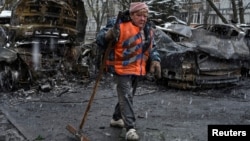
A Russian drone attack on the Ukrainian cities of Dnipro, Kharkiv, and Kramatorsk late on April 8 wounded more than two dozen people and damaged multiple residential buildings, local officials said.
Serhiy Lysak, governor of the Dnipropetrovsk region, said that "Dnipro suffered the most" from the overnight Russian attack, which wounded at least 15 people, leaving almost all of them in serious condition.
"People have cuts, shrapnel wounds, bruises, and head injuries. Some needed help due to severe stress," Lysak said.
Lysak added that the attack damaged 15 private houses and nearly two dozen cars. According to him, several business facilities, administrative buildings, and the city's infrastructure were damaged.
Ukraine's second largest city, Kharkiv, and the eastern city of Kramatorsk were also hit by the Russian drones.
Local authorities said more than 20 explosions were heard in Kharkiv, injuring at least two people.
Five others were injured in Kramatorsk, in the Donetsk region.
"An 11-year-old girl, her 34-year-old mother and a 55-year-old grandmother were wounded in the attack," said the head of the Donetsk Regional Military Administration, Vadym Filashkin.
Ukrainian President Volodymyr Zelenskyy called for support from Ukraine's partners "to save as many people as possible."
"War does not abate from talks and statements, and Moscow ignores any diplomacy because they believe they have the liberty to do so," Zelenskyy said on X.
The Ukrainian Air Force said that it shot down 32 out of 55 drones launched by Russia overnight, with another eight "not reaching their targets."
Ukraine Claims 'Successful Actions'
Meanwhile, the Russian Defense Ministry said in a post on the Telegram that its air defense units destroyed 158 drones overnight, including 29 over the southern Rostov region.
Russia’s aviation authority, Rosaviatsia, said that several airports in Russia's south were closed early on April 9 to ensure air safety.
Ukraine's top military commander, Colonel General Oleksandr Syrskiy, claimed that Kyiv had recently conducted "successful" strikes on Russian air bases.
"A few days ago, our successful actions destroyed a Tu-22M3 long-range bomber. It had just landed and our drone hit it," he told Ukrainian media outlet LB.ua.
Syrskiy claimed that the cost of such a plane could be as high as $100 million.
On the ground, according to the latest report by the US-based Institute for the Study of War (ISW), Russian forces are currently pursuing three different objectives in their attempt to capture the crucial city of Pokrovsk in the Donetsk region.
“The situation immediately south and southwest of Pokrovsk remains extremely dynamic amid intensified Russian offensive operations,” the report said.
With Russian forces spending the last 13 months trying to capture the city, the ISW further underlined that Ukrainian drone operations and localized counterattacks are continuing to complicate Moscow's advances in the area.
Earlier, this month, a unit of Ukrainian drone pilots stationed in Pokrovsk told RFE/RL's Ukrainian Service that they have become a high-value target for Russian forces.
On March 26, Zelenskyy said that Russian President Vladimir Putin was "trying to buy time and prepare for a spring offensive."
According to him, Russia was preparing a new offensive, particularly in the Sumy and Kharkiv regions.
Syrskiy said that offensive has already started.
"We are seeing an almost doubling of the number of enemy offensives in all major directions," he told LB.ua.
The ISW report said Russian forces also recently advanced in Russia's Kursk region, parts of which are controlled by Kyiv, and conducted a raid into Ukraine's neighboring Sumy region, but "likely did not establish new positions."
In the interview, however, Syrskiy again hailed Ukraine's surprise incursion into Kursk last August, saying the operation was "critical" to the defense of the Kharkiv region.
Late on April 7, Zelenskyy acknowledged publicly for the first time that Ukrainian troops are now holding new positions inside Russia -- this time in the Belgorod region.
"We continue active operations in the enemy's border areas and this is absolutely justified... Our main objective remains the same: to protect our land and our communities in the Sumy and Kharkiv regions," he said.
- By RFE/RL
Latest Round Of Trump's Tariffs Take Effect

Sweeping new tariffs on goods imported by the United States are took effect on April 9 under US President Donald Trump new trade policy, which he said is aimed at revitalizing American manufacturing.
The higher import tax rates on dozens of countries and territories include a massive 104 percent duty on Chinese goods and 20 percent on products from the European Union. The new tariffs come after 10 percent baseline tariff that went into effect on April 5.
White House spokeswoman Karoline Leavitt said that Trump had not considered an extension or delay for the increases.
“He expects that these tariffs are going to go into effect,” she said on April 8 hours before their midnight implementation.
Trump himself offered mixed signals about whether the tariffs will remain. While describing them as "permanent," he said representatives of the countries targeted were on their way to Washington to negotiate bilateral trade agreements.
"We have a lot of countries coming in that want to make deals," he said at a White House event on April 8. He said later that he expected China to pursue an agreement as well.
Trump's administration has scheduled talks with representatives of South Korea and Japan, two close allies and major trading partners. Italian Prime Minister Giorgia Meloni is due to visit next week.
EU Executive Commission President Ursula von der Leyen is among those offering a mutual reduction of tariffs but also warned that countermeasures are still an option.
Trump announced the tariffs on April 2, calling it America's "liberation day" and saying it will be remembered “as the day American industry was reborn, the day America's destiny was reclaimed, and the day that we began to make America wealthy again."
The president complained bitterly in announcing the tariffs that the United States for decades had been mistreated by "friend and foe alike” on trade, creating a massive trade imbalance.
Stock markets around the world have sunk amid the rollout of the tariffs, which economists warn will raise prices for goods that US consumers buy each day -- particularly as the new tariffs build on some previous trade measures. The countries targeted also are likely to retaliate.
China already has, announcing a 34 percent tariff on all US goods. That matched the rate before Trump announced that the United States would impose a 104 percent of China starting on April 10.
China's Commerce Ministry called Trump's threat to escalate tariffs “a mistake on top of a mistake” that “once again exposes the blackmailing nature of the US.”
Beyond levies on China, Trump imposed a steep 25 percent tariff on auto imports beginning on April 3 that was largely aimed autos made in Mexico and Canada to pressure them to take steps to control immigration and drug trafficking. These tariffs are on fully imported cars but are set to expand to applicable auto parts in the following weeks.
Canada responded with a 25 percent levy on auto imports from the United States that do not comply with the US-Mexico-Canada Agreement. Those tariffs also are slated to go into effect on April 9.
Steel and aluminum have also been targeted. Both metals are now taxed at 25 percent across the board under expanded tariffs that went into effect last month.
With reporting by AP and Reuters
US, Russia Will 'Absolutely Not' Discuss Ukraine At Talks On Embassy Operations
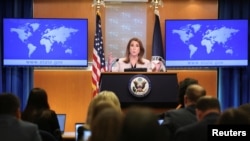
Russia and the United States are to resume talks on April 10 in Istanbul on the normalization of their respective diplomatic missions.
State Department spokeswoman Tammy Bruce told reporters on April 8 that delegations from Moscow and Washington will hold the second round of consultations focused on embassy operations.
Bruce said there would be no political or security issues discussed and stressed that the war in Ukraine would "absolutely not" be on the agenda.
"These talks are solely focused on our embassy operations, not on normalizing a bilateral relationship overall, which can only happen, as we've noted, once there's peace between Russia and Ukraine," she said.
Russian Foreign Ministry spokeswoman Maria Zakharova previously reported that the Russian delegation would be headed by Russian Ambassador to the United States Aleksandr Darchiyev, and the American delegation would be headed by Deputy Assistant Secretary of State for European and Eurasian Affairs Sonata Coulter.
The last time Washington and Moscow met in Istanbul was on February 27. Both sides described the first round of talks, which was held behind closed doors, as useful.
The American side said afterward that the meeting had defined steps to normalize the functioning of the diplomatic missions of the two countries. The Russian side said it had proposed the restoration of direct flights between the countries.
Years of tense relations led to restrictions on diplomatic work in the respective capitals. Many diplomats have been sent home by each side since Russia launched its full-scale invasion in 2022.
US President Donald Trump has pushed for improved relations since returning to the White House in January.
Russia last week sent envoy Kirill Dmitriev to Washington at the invitation of Trump envoy Steve Witkoff. Dmitriev said after the talks that he saw a "positive dynamic" in relations between Moscow and Washington, but differences remain, and several more meetings are needed to resolve them.
He also said work was under way on restoring direct flights between Russia and the United States.
With reporting by AFP and dpa
Editors' Picks
RFE/RL has been declared an "undesirable organization" by the Russian government.
If you are in Russia or the Russia-controlled parts of Ukraine and hold a Russian passport or are a stateless person residing permanently in Russia or the Russia-controlled parts of Ukraine, please note that you could face fines or imprisonment for sharing, liking, commenting on, or saving our content, or for contacting us.
To find out more, click here.





